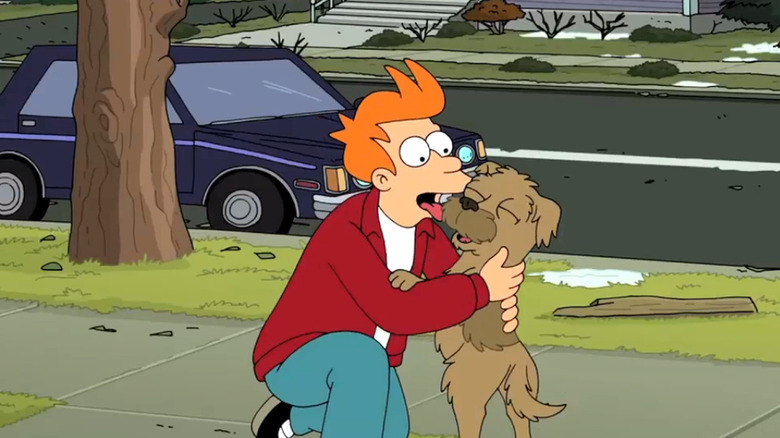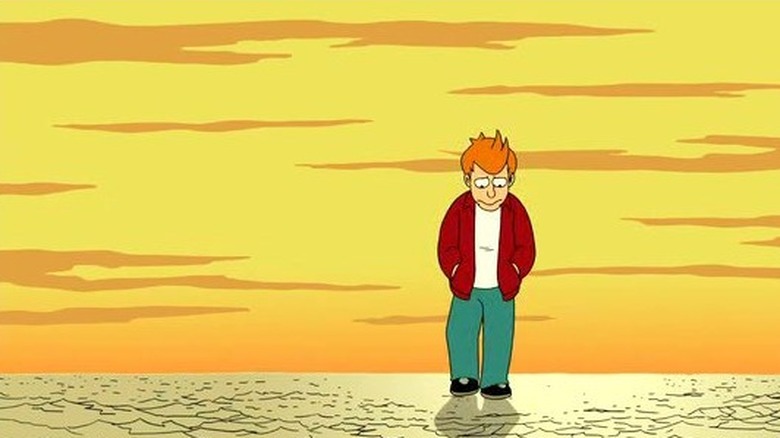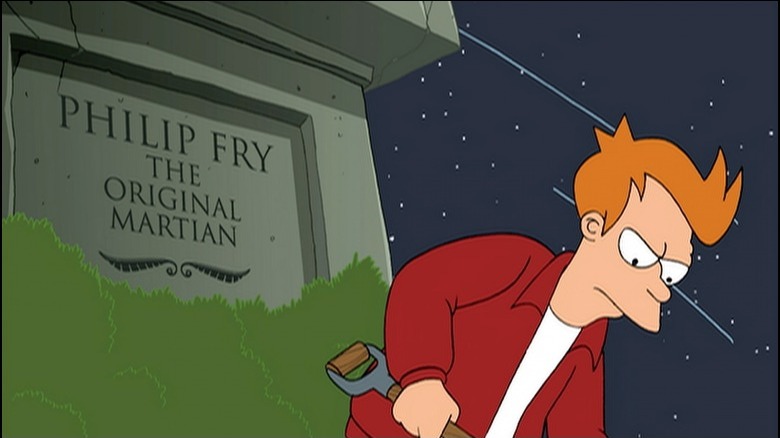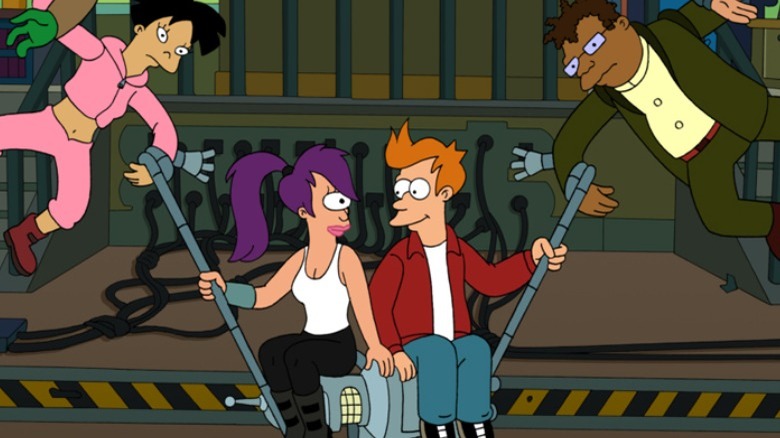An Unexpected Fan Reaction Helped Futurama Find Its Footing
While "Futurama" never ran as long as its sister show, "The Simpsons," (where show creators David X. Cohen and Matt Groening met and worked together) it has continued to survive in various forms over the decades, just recently getting renewed for a new revival season on Hulu. As an animated sci-fi futuristic workplace sitcom, it naturally had a more niche audience than "The Simpsons," but it constantly delivered, walking a tonal line that few cartoons of its era could pull off. It could make you laugh and cry, often in the form of impeccably crafted sci-fi narratives that explore the full weight of their ideas in 22 minutes.
"Futurama" got a great deal of pathos out of its initially comedic premise. The show tells the story of a loser pizza delivery boy named Philip J. Fry (Billy West), who's neglected by family and friends and ultimately ends up in a cryogenics lab on New Years' Eve 1999, where he's frozen. On waking up, he reemerges in a New New York City, with aliens and robots and all things futuristic.
That sense of distance was often funny, as was Fry's bitter recollections of the 20th century. But some years into the show's run, its writers decided to take a chance and use Fry's past as a vehicle for deeply moving sci-fi stories that happened to be part of an animated sitcom on the Fox network. The response to those episodes would change the show forever.
Bridging the gap
As "Futurama" co-creator David X. Cohen would say in an interview after the show's most recent cancellation in 2013, "when you're doing a comedy/science-fiction show the question arises: Are we making fun of science fiction, or are we doing funny science fiction?" The writers struggled with the question, eventually striking the perfect balance between comedy and sci-fi, but its early episodes lean more into a strictly comedic take on the material. "In a lot of the earlier episodes," Cohen told Nerdist in 2013, "we tried to brush the sci-fi under the table because we were afraid that people would get scared of it."
Of course, the show's creators were very familiar with the rules of science fiction, and the ridiculousness of it. Cohen, who'd been writing for "The Simpsons" from about 1992 to 1998 according to SimpsonsArchive, was the staff "science geek," which led to Matt Groening recruiting him to help develop his new sci-fi show. Ahead of pitching "Futurama" to Fox, Cohen and Groening spent a long, long time drowning in older science-fiction, from the writings of Isaac Asimov and Phillip K. Dick to the campy construction of '60s British sci-fi like "Doctor Who." They knew the language of the genre well.
Going for the heart
In the beginning of "Futurama," protagonist Fry is a stranger in a strange land. Working as a delivery guy for his distant great nephew Professor Farnsworth, he's given many opportunities to learn about the world. As the series progresses, he grows infinitely more comfortable, but moments remind him of what he's lost, whether it's an inaccurate museum exhibit on 20th-century life or his purchase of an unopened can of anchovies, the last of them.
In the stunning 2001 episode "Luck of the Fryrish," he returns to his old family home to retrieve his lucky seven-leaf clover, and he learns a great deal about what happened to his family since he was frozen. Ultimately, he finds out that his brother Yancy (Tom Kenny), with whom he always had a contentious relationship, grew to miss him terribly. Yancy even named his son after Fry. Rather than undercut the reveal with a joke, the show becomes nakedly emotional, as Simple Minds' "Don't You (Forget About Me)" (a callback to an earlier gag about "The Breakfast Club") overpowers the soundtrack into the credits.
The warm reception of the episode, as evidenced by its high placement on the Comedy Central fan-picked top 10 marathon, proved that the show's fans were comfortable with the show embracing more nuanced emotions and even the purely bittersweet. Given the close relationship the show had to its fans (who even helped the writers with continuity), it made sense they would continue delving into those themes.
Comedy, science, pathos
Further episodes like the perennial tearjerker "Jurassic Bark" (about what happened to the dog Fry took in before he was frozen) or "Leela's Homeworld" continued to lean into strikingly moving resolutions. Having new confidence about that approach, the show's writers found a perfect mix of science-fiction, comedy, and pathos, all the more special for how rare and unexpected it could be. All three aspects of the show worked together in tandem. As David X. Cohen told Nerdist, the writers "started noticing that when the episodes were taking the sci-fi seriously, those were among the fan favorites." They also would win awards.
Once the burgeoning romance between Fry and cycloptic ship captain Leela (Katey Sagal) began to bloom, the show's emotional center developed even more. "The Sting," about Leela's near-death hallucinations of Fry dying and visiting her in her dreams, was mostly funny and surreal, but it ended with a genuine, touching note of the characters' feelings. And when Fry ends up being late for a dinner date with Leela in the Emmy-winning "The Late Philip J. Fry," caught in a time machine that's barreling to the end of the universe, their connection runs across millions of years.
Luckily, the show stayed funny above all. But its writers learned that the show they made was flexible enough to incorporate greater and greater emotional complexity, along with airtight science fiction. "Futurama" became comfortable with breaking many rules over the course of its runs, but that may have been the most important.



